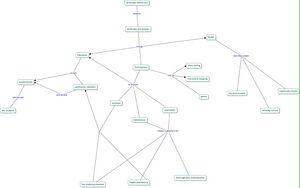Democratic Landscape Transformation 2024 - Team 11
>>> Back to working group overview
>>> Back to seminar reading list
>>> go to the Editing Help
Background of your team
Please present your team briefly. Which linguistic and cultural perspectives does each member bring in? Which disciplinary backgrounds are present in your team?
- Sattar Bashiri: Recent graduate with a B.Sc. of Landscape Engineering from The University of Tabriz - Iran
- Matilde Vitali: Student in Engineering and Architecture at the University of Bologna - Italy
- Seyedeh Fatemeh Kheirolomoom: graduated with M.S. of Architecture from Azad University of Tehran - Iran
- Laura Crocker: Student in Landscape Architecture and Plant Biology at the University of Maryland - United States
- Ahmed Rabie: Landscape architecture Master student in Weihenstephan-Triesdorf - Germany
Your Landscape Democracy Manifestoes
Here you can add links to the manifestoes you have presented on April 24. Please make sure that the links are accessible. You can also add them directly here on the wiki, they need to be png or jpg format then.
- https://drive.google.com/file/d/1kSeaZcyfL5flmTkqO4cvt9j_hJKz8s49/view?usp=sharing - Sattar Bashiri
- https://cryptpad.fr/file/#/2/file/Q+NyaeX4nrQAGkTPQS9ZBziY/ - Matilde Vitali
- https://www.canva.com/design/DAGDRmxyH6k/nScAI8ztczTpdgF0x5GggQ/edit - Seyedeh Fatemeh Kheirolomoom
- https://storymaps.com/stories/76c249d2f9e4439f84eb0d37bdd52359 - Laura Crocker
- Manifesto Ahmed Rabie
Readings, concepts and definitions
- Start: April 3, 2024
- Due: July 2, 2024
While working in your group, please start to express your personal understanding of the relation of landscape and democracy in the form of a concept map with linking words or any other diagrammatic representation. Please make your maps very visual and not just verbal. Think critically about why one map differs from another.
The final product is a shared concept map that integrates the various understandings present within your team.
About concept mapping
Before starting the exercise you can read this article by Joseph D. Novak & Alberto J. Cañas about Theory Underlying Concept Maps and How to Construct and Use Them. This paper gives a good explanation of how concept maps are conceived and developed.
You can use any tool you like for producing your concept map. However, since the result needs to be submitted digitally we recommend the following open source software for producing your maps:
- Cmap Tools >>> you can also work with your group on the Cmap cloud doing a shared map
- VUE - The Visual Understanding Environment
- Use a shared whiteboard to develop your integrated concept map, such as MIRO or MURAL
How to present your concept maps
- Possible format: JPG (for wiki upload) or link to any other resource
- We give you below a draft image gallery where you can add pictures of your map (in JPG or PNG format)
- You can present your integrated understanding as one concept map or your present individual ones and the integrated one.
- add as many additional materials as you need
Overview of your concept maps (individual and integrated)
_________________________________________________________________________________________________________________________________________________________________________________________________________________________________________________________________________________________________________
Please finish with a short reflection
- What are the similarities and differences in your team regarding your understanding of what democratic landscape transformation is? We started by trying to identify what the similarities and differences were between our ideas, and we came to the conclusion that our ideas were actually quite congruent. Some of us, compared to others, focused more on the management and policy aspect, while others more on the sustainability aspects. instead we all highlighted aspects such as participation, inclusion, and equity.
- In how far did the seminar lectures and readings help you to clarify this? In order to create our individual maps it was necessary to actively participate in the lessons but it was very useful to refer to the recommended lectures. this is because they have given us an even broader vision of the concept of democratic landscape transformation.
- What will you take home from this seminar? Thanks to this project some of us have realized that this concept is mainly characterized by aspects like the right to the people and the right to the environment. While others have noted that the empowerment of local citizens is fundamental to promote democratic landscape transformation. Instead, there are those who have focused on the idea of Preservation of cultural landscape through the idea of heritage education.




